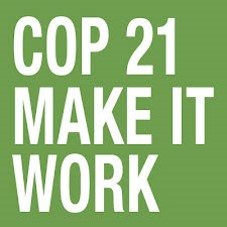

Economy
#COP21: Adoption of the Paris Agreement – The Response
3,542,253 tweets (and growing). 40,000 participants. 11,000 police. 3,000 people hired to work at the conference. 11,000 police. 147 world leaders in attendance. 13 days. One agreement.
You can read the agreement text here. Read this long article as a PDF here.
Anthony Hobley, CEO of the Carbon Tracker Initiative, said: “With this historic deal world leaders have unambiguously confirmed their commitment to limit dangerous warming and nearly every country has published its own plan to limit carbon emissions. This is a new kind of inclusive global agreement providing a framework for action. It sends a strong signal that will accelerate the low-carbon transition that is already underway.
“The necessary carbon budget to deliver the 2 degrees target and maintain ambition for 1.5 degrees means the fossil fuel era is well and truly over. There is absolutely no room for error. Fossil fuel companies will need to accept that they are ex-growth stocks and must urgently re-assess their business plans accordingly.
“New energy technologies have become hugely cost-competitive in recent years and the effect of the momentum created in Paris will only accelerate that trend. The need for financial markets to fund the clean energy transition creates opportunity for growth on a scale not seen since the industrial revolution.
“Carbon Tracker will now focus on the immediate task of translating this unambiguous signal for global financial markets, so that they can increase the flow of investment and capital towards activities that are consistent with a low-carbon world, and correctly price-in the risks associated with high-carbon activities. This ‘Paris Effect’ will build momentum behind an orderly economic transition and help minimise the destruction in value of some of the world’s biggest companies.
“The Paris Climate Summit was not only the first to agree a universal climate framework and to deliver an emphatic signal for action, it was also the first where the financial sector turned out in force. From the CEOs of some of the world’s largest pension funds, asset managers, insurance companies and banks to the Governor of the Bank of England and Chair of the international Financial Stability Board, the world’s money managers were truly engaged.
“With governments committing billions to transform their own economies and help developing countries achieve climate-secure growth, international financiers stand ready to unlock trillions of dollars to accelerate the move to a low-carbon world. They recognise the strong and growing demands for climate action from businesses, investors and other non-government actors, and they are well aware of the risks to financial markets of failing to achieve an orderly transition.”
Michael Jacobs, Senior Adviser for the New Climate Economy project, and former advisor to UK Prime Minister Gordon Brown: “This is a historic moment. The world’s governments have finally understood what the science has long been telling them – we have to act now if the earth’s climate is to remain safe. Today they have committed to act – and to act together. Historians will see this as the turning point: the moment when the world started shifting decisively away from fossil fuels and towards clean and safe energy systems. Remarkably this effectively signals the end of the fossil fuel era. This is unquestionably a great success. But the work really starts now. These commitments now need to turn into policy, and policy into investment. They can congratulate themselves for 24 hours – now they need to act.”
Jennifer Morgan, World Resources Institute, said: “This agreement would mark a true turning point in the global effort to address climate change. The text reflects both the push for high ambition and the voices of the most vulnerable. It accelerates the energy transformation that is well underway, pointing us to a safer and stronger future.”
Monica Araya, member of the Climate Vulnerable expert group, said: “This agreement marks the beginning of a new era where we find good examples of climate action from all, developed and developing countries, because it is in everyone’s best interests to do so. It is no longer about who is acting and who is not, but how strong the world can act together.”
Nigel Topping, We Mean Business (WMB), said: “This is a remarkable diplomatic settlement and a historic economic catalyst. The world’s governments have sent a decisive signal to businesses and investors that will accelerate the shift towards a thriving, clean global economy. The Paris Agreement for net zero emissions will turn the billions of investment we’ve seen so far into the trillions the world needs to bring clean energy and prosperity to all. The diplomatic process that included businesses, investors, cities, states, regions and civil society created a powerful alliance which has clearly raised the level of ambition in the negotiations. Businesses and investors look forward to playing a continued role in turning this agreement into on the ground reality.”
Major General (ret) A M N Muniruzzaman, Chairman of Global Military Advisory Council on Climate Change (GMACCC) Bangladesh, said: “Military leaders, assembled under GMACCC, realising the fragility of the situation call upon leaders for urgent action to implement the Paris agreement, to save mankind from the catastrophic consequences of climate change. The Paris agreement must be more than paperwork. Its success depends on a verifiable, implementable, transparent and fair agreement which is made accountable. The military has a new, definitive, more humanitarian role, to deal with millions of people on the move, and this will only grow over time as climate impacts bite.”
Christoph Bals, Political Director at Germanwatch, said: “Our experience in Germany has shown that renewable energy can be scaled up rapidly with significant economic benefit. The decarbonisation signal from the Paris Agreement will increase and accelerate these benefits, but Germany still needs to up its game. Chancellor Merkel needs to commit to a plan to phase out the use of coal within the next two decades. The Paris outcome requires developed countries to come back next year with a credible plan for reaching their 2020 targets – that just is not going to be possible without a coal phase-out.”
Chris Field, Founding Director, Carnegie Institution’s Department of Global Ecology, said: “The world truly reached a turning point with the historic Paris agreement, but this is not a time for self-congratulations. This is our moment to unleash ambition with new levels of innovation, building the clean energy system of the 21st century, developing sustainably, and comprehensively protecting people and the planet.”
Muhtari Aminu-Kano, Senior Policy Advisor in Poverty Reduction at Islamic Relief Worldwide, an international humanitarian organization, and the former CEO of Nigeria’s leading national environmental NGO, said: “Muslims living in some of the world’s poorest and most vulnerable countries can be hopeful that this climate deal provides a foundation for positive change. In August, Muslim leaders laid out in a declaration, grounded in the Qur’anic teachings, their vision of the low-carbon future necessary for the peace and prosperity of the planet: while COP21 reaffirmed that this vision is necessary and feasible with strong political willpower, the various positive announcements of the last two weeks (and last six years) prove that it is already on its way to becoming a reality. There is still much work to be done: the Muslim community, in continued solidarity with those from other faiths and humanity at large, must now encourage those in Paris and beyond to live out their pledges and take responsibility as stewards of the Earth.”
Rob Bernard, Chief Environmental Strategist, Microsoft, said: “Microsoft stands with the many voices within the private and public sectors urging the negotiators in Paris to come to a final agreement on climate change. Reaching agreement on a long-term goal framework for cutting carbon emissions and achieving GHG neutrality is critical to address climate change. It will also provide the certainty required for corporations around the world to accelerate their low-carbon investments and foster the creation of a true low-carbon global economy.”
Kathleen McLaughlin, chief sustainability officer for Wal-Mart Stores, Inc., said: “We believe climate change is an urgent and pressing challenge, and it is clear that we must all do our part to reduce, avoid and mitigate the impact of rising greenhouse gas (GHG) levels. That’s why we support the UN’s call for the U.S. corporate sector to commit to science-based targets to reduce emissions. In addition, we have already successfully decoupled our growth from emissions, and recently announced that we exceeded our goal to reduce 20 MMT of GHG emissions from our supply chain.”
Kevin Rabinovitch, Global Sustainability Director, Mars Incorporated, said: “Back in October, we joined with the rest of the food and drink industry calling on global leaders to embrace the opportunity presented in Paris. Now really is the time for talk to become action and to meaningfully address the reality of climate change. Global policy makers should think big. Because big thinking leads to big results. Having a long term science based target will drive ideas and innovation, ultimately making what may have seemed impossible – possible. We are on the cusp of a deal that can change the world. And as a business we are committed to tackling the climate challenges that face us. We hope that global leaders will do the same.”
Professor Peng Gong, Co-Chair, Lancet Commission on Health and Climate Change, Tsinghua University, Beijing, said: “Beijing’s first-ever ‘red alert’ this week, called due to dangerous levels of air pollution in the city, is a clear symbol of the crucial importance of a strong climate deal here in Paris. Concerted action on climate change, particularly through a transition to clean energy, has immense potential to protect respiratory and cardiovascular health and to improve quality of life. In China, it is estimated that over 4000 people die every day as a result of air pollution, much of which comes from burning coal, and worldwide, air pollution is responsible for 7 million deaths every year: a shocking one in eight of all deaths. By accelerating the transition to healthy renewable energy sources and continuing to scale up climate ambition over the coming years, we can protect millions of people from air pollution as well as the serious health impacts of climate change.”
Dr. Xavier Deau, Former-President of the World Medical Association, said: “We the physicians have the ethical duty to stand for the health of the population, so do all the politicians here in France today. We leave Paris with a strong public health agreement and are encouraged to see elements crucial to the protection of health central to the final agreement. Millions of physicians around the world have their eyes on Paris and are now looking forward and calling on their governments to get to work protecting the health of their populations.”
Mr José Luis Castro, Executive Director of the International Union Against Tuberculosis and Lung Disease, said: “The Paris Climate Agreement cements a decisive call for concerted action to reduce emissions which are toxic to human and planetary health. It is now the duty of the health community to work with others to ensure that these emissions are dramatically reduced – to reduce exposure to leading NCD risk factors, limit global warming, and promote health for all.”
Ms Johanna Ralston, CEO of the World Heart Federation, said: “The adoption of the Paris Climate Agreement and its embedded references to health mean that NCDs and other health issues can no longer be side-lined in the global response to climate change. The NCD Alliance and its Federations are dedicated to ensuring a comprehensive response to create sustainable environments in which we can live, work and prosper.”
Ms Katie Dain, Executive Director, NCD Alliance, said: “The adoption of the Paris agreement is an unprecedented victory for people and planet, and a catalyst for the next phase of action. Now, all of government and all of society must come together in a coordinated response to mitigate the impacts of global warming, NCDs and ill-health.”
Professor Hugh Montgomery, Co-Chair of the Lancet Commission on Health and Climate Change, said: “The impact of climate change on everything from food production to heat stress and water scarcity means it poses the single biggest threat to global health. This agreement is incredibly important for beginning to ease that health burden, ultimately saving lives. It will also set us on a path to a cleaner, less polluted world which in turn reduces costs for our healthcare systems.”
Dr. Diarmid Campbell-Lendrum, Climate Change Lead, World Health Organization, said: “Every tonne of carbon that we put into the atmosphere turns up the planet’s thermostat, and increases risks to health. The actions that we need to take to reduce climate change would also help clean up our air and our water, and save lives. To take a medical analogy: We already have good treatments available for climate change, but we are late in starting the course. The Paris Agreement helps us take this forward and is a crucial step in protecting our climate and our health.”
Dr. Bettina Menne, Climate Lead, WHO Europe, said: “As doctors, nurses, and other health professionals, it is our duty to safeguard the health of our families and communities. The Paris Agreement takes us one step closer to securing a future which protects the public from the impacts of climate change – the defining health issue of this century. Today, we are leaving France with a deal that bolsters community resilience, strengthens our health systems, and helps to tackle inequalities.”
Lord Michael Howard said: “An unprecedented gathering of world leaders including David Cameron opened these talks with a call to negotiators to work to reach a deal in Paris, and they have delivered.
“Ably guided by their French hosts, this is the culmination of a long, drawn-out process lasting many years, but the end result is game changing. The deal is good for Britain, and a credit to the efforts of the Prime Minister and Amber Rudd.”
Marylyn Haines Evans, National Federation Of Womens Institutes (NFWI) Vice Chair and Chair of NFWI Public Affairs, said:“Ordinary people in Britain, like WI members, have repeatedly voiced their concerns about the threat climate change poses to people’s wellbeing and our natural habitats.
“Women around the world are more often on the sharp end of climate change and by our members it’s seen as a particular challenge for our children and grandchildren, so the importance of addressing it now, rather than leaving it for the future, can’t be overstated. This deal gives us hope and should help to bring more balance back to our climate.”
Guy Smith, NFU Vice President, said: “Farmers here in Britain, and indeed around the world, are on the front line of climate change. We are amongst the first to see the impacts in our daily work bearing witness to extreme weather events such as flooding and drought. Tackling both the causes and effects of climate change will be vital to make our food supply more resilient, as farmers invest to produce more with less impact on the environment, both today and in the future.”
Prof Joanna Haigh, Co-Director of the Grantham Institute at Imperial College London, said: “This agreement is highly significant in the way in which it responds to the scientific evidence around climate change. The science has never been clearer about the risks we face and the new aim of keeping temperature rise to 1.5 degrees better reflects these risks.”
Richard Benyon, Conservative MP for Newbury and former environment Minister, said: “The British government has demonstrated an important leadership role in the international negotiations, reflecting conservative values such as respect for sound science and economics, as well the need to protect the natural world. This is a hugely significant moment and Amber Rudd in particular deserves praise for her role in the tough, crucial, final days of the talks.”
Professor Hugh Montgomery, Co-Chair of the Lancet Commission on Health and Climate Change, and Director of the Institute for Human Health and Performance at UCL, said: “The impact of climate change on everything from food production to heat stress and water scarcity means that it poses the single biggest threat to global health.
“This agreement is incredibly important for beginning to ease that health burden, ultimately saving lives. It will also set us on a path to a cleaner, less polluted world which in turn reduces costs for our healthcare systems.”
Dr Camilla Toulmin, Senior Fellow of the International Institute for Environment and Development (IIED) said: “Ahead of this summit the Prime Minister said a new deal in Paris was essential for tackling global poverty and he was right.
“The poorest are most often at the sharp end of the extremes of drought and flooding that climate change brings. The deal in Paris, while not perfect, gives poorer countries the hope of a safer, cleaner and more prosperous future and it’s huge significance cannot be over-stated.”
Rushanara Ali MP, Labour Member of Parliament for Bethnal Green and Bow, said: “Politicians and climate change negotiators from around the world have finally caught up with the real-world, where there has been a significant shift in public opinion to move away from dirty energy and towards clean solutions.
“The deal is of huge significance, but the work is not over yet. Britain needs to do far more to ensure that progress does not slow down. One way to facilitate this is to lead by example by doing much more to support renewable and clean energy at home.
Sven Harmeling, Climate Change Advocacy Coordinator of CARE International said: “Climate change is already causing devastating impacts for poor people around the world. Developed countries politicised the issue of loss and damage in the Paris talks, trying to limit options for poor countries to deal with climate threats. With the Paris Agreement, all countries promise not to leave the poor behind. Developed countries now leave Paris with an even higher moral obligation to rapidly cut their emissions and scale up financial support for the most vulnerable people.”
“Civil society and a broad coalition of countries fought hard to ensure that human rights and gender equality are enshrined in the Paris deal. The Paris Agreement can be a springboard for strengthened action on human rights and climate change, if all countries deliver on their promises.”
“The next five years are critical for scaling up climate action across the world before the Paris Agreement comes into force in 2020 and to deliver the promises made in Paris. The climate problem has not yet been solved; as the poorest and most vulnerable people will continue to bear the brunt of climate impacts, CARE will continue the fight for climate justice.”
Wendel Trio, Director of Climate Action Network Europe said: “All countries have agreed upon the pathway to phase out all fossil fuels, but failed to make headway towards this common goal. This is why the hard work needs to continue after the summit. The EU now needs to live up to the Paris agreement and recalibrate the climate targets for 2030 during the next European Council in March. It also needs to cut emissions much more drastically starting now. In particular, we expect the European Council to raise the 2030 emission reduction target well beyond 40%, to improve the renewables and energy efficiency targets and to phase out fossil fuel subsidies”.
Moreover, the rich countries have to provide more financial support for the poor, to empower them to pursue development pathways that leapfrog the use of dirty and polluting energy and thus make the limit of 1.5 degrees Celsius a realistic one.
“The EU has a vital role to play in the global transition towards 100% renewables. It needs to learn from what happened in Paris. Only when the EU works in an alliance with others, it can have an impact. Therefore, it struggled to build bridges over key sticking points in the agreement, such as climate finance and differentiation. In the coming months the EU will need to validate its high ambition alliance with concrete support to the poorest and most vulnerable countries.”
WWF’s head of delegation Tasneem Essop said: “By including a long-term temperature goal of well below 2C of warming with a reference to a 1.5C goal, the latest draft text sends a strong signal that governments are committed to being in line with science. What we need now is for their actions, including emission reductions and finance, to add up to delivering on that goal.
“There are opportunities to do so built in the agreement – such as the facilitative dialogue in 2018 – that should be used to update current country pledges, and then further opportunities after 2020. Finance and emissions reductions pledges will need to be enhanced in a fair manner before 2020 to stand any chance of achieving the long term goal.
“A big concern is that there’s no guarantee of assistance for those who will suffer from immediate climate impacts, especially the poor and the vulnerable.
“The agreement does contain elements that create the opportunity to make governments actions stronger and stronger over time, in terms of mitigation, adaptation and finance. This is critical.”
WWF-UK Chief Executive David Nussbaum said: “We have a clear vision in the strong long term goal; mechanisms to address the gap between that aspiration and the countries’ current commitments; and the foundations for financing the transition to a low-carbon future.
“The Paris deal is not just about reducing emissions, but also about protecting vulnerable places and people.”
Dr Bill Hare, CEO of Climate Analytics, said “The Paris agreement is a historic turning point for the whole world. One of the most remarkable outcomes of the agreement is that its objective is to “pursue efforts to limit” global warming to 1.5oC above preindustrial, while holding warming “well below 2oC”.
“In doing so, the global community has recognised that the risks of global warming are far greater than previously understood, and that the scientific basis compelling very urgent action has never been stronger.
“It is a victory for the most vulnerable countries, the small islands, the least developed countries and all those with the most to lose, who came to Paris and said they didn’t want sympathy, they wanted action.
“The Paris Agreement calls for all the world’s nations to cooperate to peak global emissions as soon as possible and to undertake rapid greenhouse gas emission reductions bringing emissions to net zero in the second half of the century. Importantly, this is to be done taking the best available science into account.
“While the agreement is itself historic, the challenges ahead in achieving it will dominate the 21st-century. The agreement has been made at a time when national greenhouse gas emission reduction contributions for 2025 and 2030 together far exceed the levels needed to hold global warming well below 2oC, let alone limit to 1.5oC.”
Stephanie Pfeifer, CEO of IIGCC, said: “ The Paris Agreement is a historic turning point for investors. If adopted, 195 countries will together opt to signal their intention to decouple their prosperity and development from fossil fuel use – sending a very strong signal to business and investors that there is only one future direction of travel to reduce emissions in line with a 1.5 degree pathway. Investors across Europe will now have the confidence to do much more to address the risks arising from high carbon assets and to seek opportunities linked to the low carbon transition already transforming the world’s energy system and infrastructure. The more predictable framework this agreement heralds for climate finance should also help unlock significantly more investment for emerging economies and developing countries.”
Juliet Davenport OBE, CEO of Good Energy said: “I think COP21 has exceeded many expectations and it’s no exaggeration to say this is a turning point in history. The French have done a fine job in harnessing the momentum and ambition which has been so much more tangible in Paris than at previous conferences. Now there is more than just hope for the most vulnerable places on Earth like the Marshall Islands. And the switch to renewable energy across the world has a clear pathway now.”
Mohamed Adow, Christian Aid’s Senior Climate Advisor said: “For the first time in history the whole world has made a public commitment to reduce greenhouse gas emissions and deal with the impacts of climate change. Although different countries will move at different speeds, the transition to a low carbon world is now inevitable. Governments, investors and businesses must ride this wave or be swept away by it.
“Negotiations were long and hard fought but the result is an agreement which will usher in a new dawn of climate aware politics. The era of politicians burying their heads in the sand is over.
“This is a historic agreement and the culmination of a path the world set out on four years ago. The baby conceived in Durban has now been born. Like any infant it needs to be nurtured so that it grows stronger over time. It will be up to national governments to ensure this happens.
“This deal must echo through boardrooms and stock-exchanges around the world – the era of dirty investments is over. The profitable, forward-looking business opportunities of the future lie in clean investment.
“Crucially the Paris Accord has not left poor countries behind. Richer countries have committed to deliver the finance they promised to help developing countries adapt and grow in a clean and sustainable way. For the first time in an international treaty clear consideration has also been given to loss and damage – support for countries facing climate change so severe it can’t be adapted to.
“This deal, in itself, will not deliver a safe world below 2 degrees. But it gives us a fighting chance to close the gap between the emissions the world is on course to produce and those that will put us on course to the agreed path. Leaders must increase their commitments before 2020 and every five years thereafter to ensure the deal evolves to meet the needs of a changing world.
“We’re already seeing the impacts of just 0.85 degrees of warming; floods, droughts, sea level rise and extreme weather. If the deal is to achieve its aspiration of limiting temperature rise to below 1.5 degrees then it will require countries to show they mean business.
“Rather than just aspiring to this 1.5 degree limit countries actually put in place a practical long term goal of zero emissions by the second half of the century.”
“The Paris agreement is testament to the hard work and commitment of successive British governments to the climate talks for over 20 years. David Cameron and Amber Rudd have inherited that legacy and must now bring the deal back home and put words into action. As the world’s fifth largest economy, Britain is a major player at such global summits. Their early promise of climate finance and the landmark decision to phase out coal power showed the kind of national actions needed to secure a deal. This represents a success for Britain’s long term national and international climate policy.
“Under David Cameron the UK pioneered the world’s first Climate Change Act, and now hundreds of other countries are on board. There is now no excuse not to introduce ambitious policies to deliver the Climate Change Act and accelerate the low carbon economy. For a country that is serious about the economics of the future and takes responsibility for its place in an interconnected world, these actions are no longer optional, they are necessary. The Government must take a close look at its domestic energy policies which are currently confused and holding back Britain’s low carbon energy potential.”
Philippe Lévêque, Executive Director of CARE France said: “The Paris Agreement gives a ray of hope to the world’s poorest and most vulnerable people on the frontlines of escalating climate impacts, but its significance depends on governments’ ability to deliver on the promises made in Paris today. The fight to build a climate safe world is not yet over.”
Ruth Mitei, Advocacy Advisor CARE International’s Adaptation Learning Programme for Africa said: “The climate vulnerable countries, supported by the civil society, led the way to increasing the ambition of the climate deal. The inclusion of the 1.5°C temperature limit in the agreement is a big win for the world’s poorest people. Now governments must accelerate the shift away from fossil fuels to renewable energies, and avoid false solutions which threaten people’s food security.”
Adrian Ramsay, CEO of the Centre for Alternative Technology, said: “We welcome the deal to keep global temperature rise to well below 2C, with an aim to keep it below 1.5C – this is a significant step forward in the global recognition of the dangers of climate change. However, the deal does not set out a timeline for the phasing out of fossil fuels, and therefore fails to offer a good chance of meeting its own target.
“The COP agreement must rapidly convert its goals into new national pledges in line with what the science tells us about how much remaining carbon can safely be burned. It should also acknowledge that the major share of this belongs to developing nations that have not been burning coal, oil and gas for the past 150 years.
“To have a reasonable chance of meeting the 2C goal, all investment in new fossil fuels must be halted now – both coal and fracking. Public funds spent subsidising fossil fuels should be redirected into renewable energy and used to support poorer majority world countries to build the clean energy infrastructure they need.
“The science says we need to reach net zero greenhouse gas emissions globally by mid-century. CAT’s Zero Carbon Britain research has shown that this is achievable using technology available today. The UNFCCC has set the goal – now they must implement the pathways to achieving it.”


 Features10 months ago
Features10 months agoWhat is the Eco-Friendliest Option to Wash Your Dishes?

 Environment12 months ago
Environment12 months agoBuilding a Career in Green Construction: Tips and Insights

 News11 months ago
News11 months ago5 Ways Fleet Maintenance Software Can Help Businesses Be More Eco-Friendly

 Features10 months ago
Features10 months agoAddressing Pressing Ethical Concerns with Crypto Exchanges





























